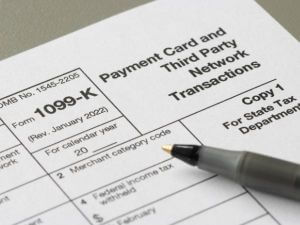1099-K Changes Delayed Until 2024
Source: Alonia Johnston, McKonly & Asbury
Many people use Venmo, PayPal, and Facebook Marketplace for both personal and business transactions. People sell items they no longer have a use for and buy the items they need. As 2023 comes to an end, the Internal Revenue Service (IRS) has released a notice finalizing the reporting thresholds on 1099-K Forms for the 2023 calendar year. If an individual or business provides goods or services and uses payment apps or online marketplaces to accept payments, this will clarify their reporting thresholds.
For 2023, the thresholds remain unchanged from 2022 following the release of Notice FS-2023-27, Nov. 2023. After all the stress and worry through the first ten months of the year, the IRS has released their decision to delay the implementation of changes until 2024. If one  receives $20,000 in gross sales from goods or services AND has more than 200 transactions in the calendar year, they should receive a 1099-K.
receives $20,000 in gross sales from goods or services AND has more than 200 transactions in the calendar year, they should receive a 1099-K.
Beginning in 2024, if one receives $5,000 in gross sales from goods or services, they should receive a 1099-K.
Payment Types that Earn a Form 1099-K
- Goods one sells.
- Services one provides.
- Property one rents.
- Payment apps.
- Online community marketplaces.
Auction sites. - Car sharing or ride-hailing platforms.
- Ticket exchanges or resale sites.
- Crowdfunding platforms.
- Freelance marketplaces.
What to Do if a Form 1099-K is Received
Be sure to review these forms, determine if the amount is correct, and check if there are any deductible expenses associated with these payments. Anyone who sold personal items must determine if the amounts on their forms were losses or gains for accurate reporting purposes.
- Selling at a loss
- If one paid more for the item than what they sold it for, this is considered a loss.
- One can report both the original payment and the amount received to offset the adjustment.
- This would need to be reported on a Schedule D Capital Gains and Losses. The amount originally paid and the date would be needed, as well as the amount received when sold and the date.
- Selling at a gain
- If one received more than they paid for item, it is considered a gain and will need to be reported as income, which will be taxable.
- This would need to be reported on a Schedule D Capital Gains and Losses. The amount originally paid and the date would be needed, as well as the amount received when sold and the date.
Items that Should Not be Reported on Form 1099-K
Personal Transactions – these payments are not taxable and should not be reported on these forms.
- Birthday or Holiday gifts.
- Reimbursement for expenses to friends and family members.
If someone believes the information on their Form 1099-K is incorrect, or it was issued in error, there are a few options that they can take. They can contact the filer, whose name and contact information should appear in the upper left corner on the front of the form. One could also try and contact the payment settlement entity, whose name and phone number should be shown in the lower left side of the form, to assist with providing a corrected form. For more information on understanding the Form 1099-K, please visit this website.
Finally, if one finds themself with a Form 1099-K for next tax season for personal items sold and are not sure where to go or what to do with it, they should reach out to an accounting professional on the best way to handle this and correct it on their tax return.
For specific questions or additional information, please contact Alonia Johnston.
